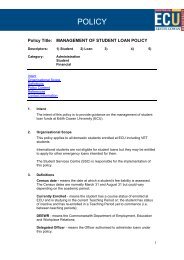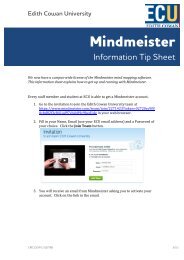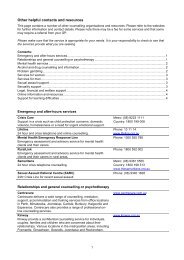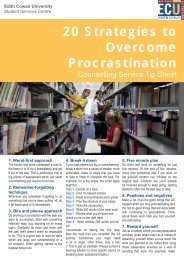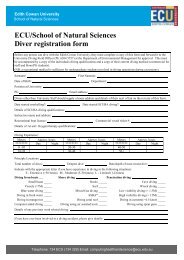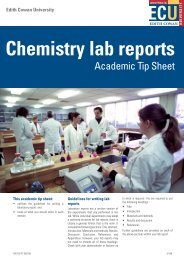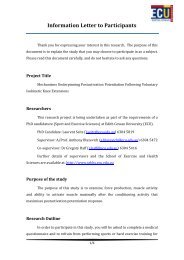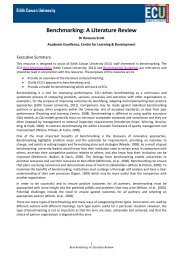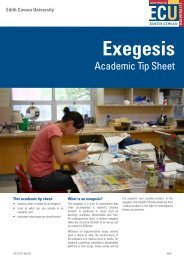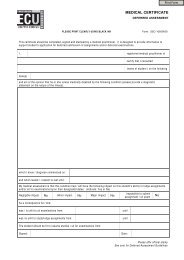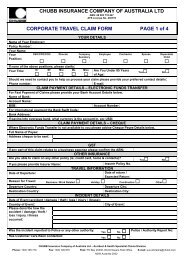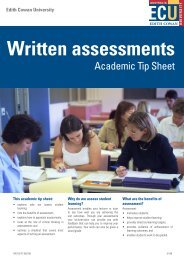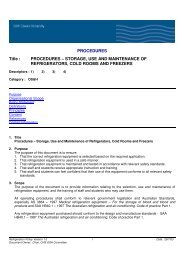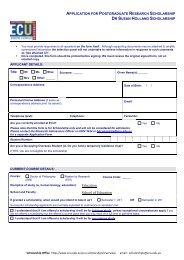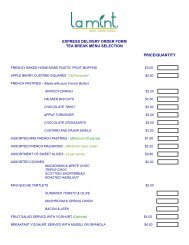Education Services for Overseas Students - ECU | Sign In : Portals ...
Education Services for Overseas Students - ECU | Sign In : Portals ...
Education Services for Overseas Students - ECU | Sign In : Portals ...
Create successful ePaper yourself
Turn your PDF publications into a flip-book with our unique Google optimized e-Paper software.
<strong>Education</strong> <strong>Services</strong><br />
<strong>for</strong> <strong>Overseas</strong> <strong>Students</strong><br />
(ESOS)<br />
A Guide <strong>for</strong> <strong>ECU</strong> Staff<br />
Centre <strong>for</strong> Learning and Development Telephone: +61 8 6304 2554<br />
Email: cld@ecu.edu.au Web: http://www.ecu.edu.au/centres/centre-<strong>for</strong>-learning-and-development/overview<br />
1
2<br />
Sitemap<br />
INTRODUCTION 4<br />
INTERNATIONAL ENGAGEMENT 4<br />
VISA PROGRAMME 4<br />
OUR OBLIGATIONS 4<br />
THE ESOS FRAMEWORK 6<br />
OUR STUDENTS 6<br />
NEW COURSES OR MODIFICATIONS OF EXISTING COURSES 8<br />
THINGS TO KNOW 9<br />
BEFORE ENROLMENT 9<br />
COURSE CREDIT 9<br />
FOR THE COURSE COORDINATOR 9<br />
MODES OF STUDY 10<br />
GROUNDS ON WHICH ENROLMENT MAY BE DEFERRED, SUSPENDED OR CANCELLED 10<br />
FOR THE COURSE COORDINATOR 11<br />
COMPASSIONATE OR COMPELLING CIRCUMSTANCES 11<br />
DESCRIPTION OF THE ESOS FRAMEWORK 12<br />
COURSE FEES AND REFUNDS 12<br />
WHEN THE STUDENT ARRIVES 14<br />
ORIENTATION PROGRAM 14<br />
FOR THE COURSE COORDINATOR 14<br />
IMPORTANT – PLEASE READ 15<br />
MODE AND PLACE OF STUDY 15<br />
DURING THE COURSE 16<br />
STUDENT SUPPORT SERVICES 16<br />
FOR THE COURSE COORDINATOR 16<br />
MONITORING PROGRESS 16<br />
FOR THE COURSE COORDINATOR 17<br />
INTERVENTION STRATEGY 17<br />
TRANSFERRING PROVIDERS 18<br />
PRINCIPAL COURSE 18<br />
EXCEPTIONS TO THE RELEASE LETTER REQUIREMENT 18<br />
STUDENTS TRANSFERRING 19<br />
ASSESSING REQUESTS FOR A LETTER OF RELEASE 19<br />
GRANTING A LETTER OF RELEASE 19<br />
LETTERS OF RELEASE AND PACKAGED COURSES 19<br />
REFUSING A LETTER OF RELEASE 20<br />
STUDENTS WITHDRAWING FROM A COURSE 20<br />
EXTENDING THE DURATION OF A COURSE, VARYING ENROLMENT LOADS 20<br />
FOR THE COURSE COORDINATOR 21<br />
GREIVANCES 21<br />
COMPLAINTS AND APPEALS 21<br />
Centre <strong>for</strong> Learning and Development Telephone: +61 8 6304 2554<br />
Email: cld@ecu.edu.au Web: http://www.ecu.edu.au/centres/centre-<strong>for</strong>-learning-and-development/overview
FOR THE COURSE COORDINATOR 22<br />
STAFF CAPABILITY AND EDUCATIONAL RESOURCES 22<br />
FOR THE COURSE COORDINATOR 22<br />
WORK RIGHTS 23<br />
STUDENTS NEED TO BE INFORMED THAT THEIR PERSONAL INFORMATION MAY BE<br />
SHARED 24<br />
WHAT SORT OF INFORMATION DOES <strong>ECU</strong> HAVE TO COLLECT? 24<br />
WHAT IS THIS INFORMATION USED FOR? 25<br />
WHAT SHOULD PROVIDERS KEEP IN MIND WHEN COLLECTING PERSONAL INFORMATION FROM<br />
STUDENTS? 25<br />
WHAT HAPPENS IF A COURSE CAN’T BE DELIVERED (AND THE STUDENT HAS<br />
ENROLLED)? 27<br />
WHAT IS THE TUITION PROTECTION SERVICE? 27<br />
MEANING OF COURSE MONEY 27<br />
IS THE STUDENT UNDER 18? 28<br />
STUDENT RESPONSIBILITIES 29<br />
THE COURSE DEVELOPMENT PROCESS 30<br />
FIRST – DEVELOP THE COURSE 30<br />
ESOS FRAMEWORK 31<br />
SANCTIONS AND PENALTIES 32<br />
Centre <strong>for</strong> Learning and Development Telephone: +61 8 6304 2554<br />
Email: cld@ecu.edu.au Web: http://www.ecu.edu.au/centres/centre-<strong>for</strong>-learning-and-development/overview<br />
3
4<br />
Sitemap<br />
<strong>In</strong>troduction<br />
<strong>In</strong>ternational engagement<br />
Edith Cowan University (<strong>ECU</strong>) gains significant benefits from the education provided<br />
to <strong>In</strong>ternational students. Our international engagement can trans<strong>for</strong>m students, widening<br />
their intellectual horizons, opening them to new ideas and experiences, and extending their<br />
friendships. <strong>In</strong>ternational students also contribute intellectually to the <strong>ECU</strong> community, and<br />
provide diverse social and cultural perspectives that enrich the educational experience <strong>for</strong><br />
our Australian students.<br />
These benefits rely on confidence in the integrity and quality of that service. A<br />
consistent national approach has been developed and <strong>ECU</strong> is required to implement and<br />
comply with this approach.<br />
<strong>ECU</strong> needs to ensure that we deliver a quality service and be aware of the ways in<br />
which overseas students may breach the conditions of their student visa. The ongoing<br />
benefits of international education requires maintenance and enhancement of <strong>ECU</strong>’s<br />
reputation as a provider of high quality education to overseas students.<br />
The enhancement of quality, consumer protection and integrity of the student visa<br />
programme are achieved through collaboration between all government agencies.<br />
Visa Programme<br />
Our international education programme is closely linked to the Australian<br />
Government’s student visa programme. Adherence to migration law is essential to ensure<br />
public confidence in the student visa programme and to ensure the provision of high quality<br />
education and training opportunities to students. <strong>ECU</strong> has to notify the Australian<br />
Government when students have breached their student visa conditions as a result of having<br />
failed to maintain satisfactory course progress or attendance.<br />
Our Obligations<br />
“The registered provider must ensure that its staff members who interact directly with<br />
students are aware of the registered provider’s obligations under the ESOS framework and<br />
the potential implications <strong>for</strong> students arising from the exercise of these obligations ”<br />
(National Code 2007, Standard 6.7)<br />
The <strong>Education</strong> <strong>Services</strong> <strong>for</strong> <strong>Overseas</strong> <strong>Students</strong> (ESOS) Act 2010 and its recent<br />
amendments (Amendment Bill 2011) provides assurances of quality education and<br />
consumer protection <strong>for</strong> international students studying in Australia. The Act places<br />
obligations on both the <strong>Education</strong> Provider (<strong>ECU</strong>) and the student. <strong>ECU</strong> is required to<br />
provide students with We are required to provide students with specific in<strong>for</strong>mation and to<br />
advise them correctly so that they can make in<strong>for</strong>med decisions.<br />
Centre <strong>for</strong> Learning and Development Telephone: +61 8 6304 2554<br />
Email: cld@ecu.edu.au Web: http://www.ecu.edu.au/centres/centre-<strong>for</strong>-learning-and-development/overview
This booklet is aimed at staff dealing with overseas students so that they can assist with<br />
fulfilling this requirement.<br />
<strong>ECU</strong> as the registered provider must ensure that its staff members that interact directly with students<br />
are aware of <strong>ECU</strong>’s obligations under the ESOS framework and the potential implications <strong>for</strong> students<br />
arising from the exercise of these obligations. The purpose of this booklet is to assist with this.<br />
Centre <strong>for</strong> Learning and Development Telephone: +61 8 6304 2554<br />
Email: cld@ecu.edu.au Web: http://www.ecu.edu.au/centres/centre-<strong>for</strong>-learning-and-development/overview<br />
5
6<br />
Sitemap<br />
The ESOS Framework<br />
The ESOS Act (2010) protects student interests and aims to ensure high quality education<br />
services by describing minimum standards on a range of issues in its legislation. The ESOS<br />
Framework links with migration laws and imposes visa related reporting requirements on<br />
both students and education providers.<br />
Detailed in<strong>for</strong>mation is available here on the ESOS Framework on the Australian <strong>Education</strong><br />
<strong>In</strong>ternational websites.<br />
Note that the ESOS Framework only applies to students if they are studying on a student<br />
visa. Other visa subclasses such as business and spouse are not bound by this legislation.<br />
(Adapted from the <strong>ECU</strong> website at http://www.ecu.edu.au/international/study-in-australia/ourcourses/government-rules-and-regulations)<br />
<strong>In</strong> the 2010 survey, 86% of all international student respondents were satisfied or very<br />
satisfied with their overall living experience in Australia and 84% were satisfied with their<br />
study experience. This compares to figures of 85% (living) and 84% (study) <strong>for</strong> international<br />
students who participated in the 2006 <strong>In</strong>ternational Student Survey (ISS)(<strong>In</strong>ternational<br />
Student Survey 2010 Overview Report).<br />
Our students<br />
Figure 1: <strong>In</strong>ternational student numbers 2011<br />
Centre <strong>for</strong> Learning and Development Telephone: +61 8 6304 2554<br />
Email: cld@ecu.edu.au Web: http://www.ecu.edu.au/centres/centre-<strong>for</strong>-learning-and-development/overview
Figure 2: <strong>In</strong>ternational student numbers by location and their ages<br />
The data in this snapshot cover ALL offshore international students. The data was obtained from higher<br />
education statistics:<br />
http://www.deewr.gov.au/Higher<strong>Education</strong>/Publications/HEStatistics/Publications/Pages/Home.aspx and from<br />
http://www.aei.gov.au/research/Research-Snapshots/Pages/default.aspx.<br />
Centre <strong>for</strong> Learning and Development Telephone: +61 8 6304 2554<br />
Email: cld@ecu.edu.au Web: http://www.ecu.edu.au/centres/centre-<strong>for</strong>-learning-and-development/overview<br />
7
8<br />
Sitemap<br />
New Courses or Modifications of Existing Courses<br />
The diagram below shows the procedures that need to be followed when developing a new<br />
course or when modifying an existing course, in order <strong>for</strong> <strong>ECU</strong> to be compliant with<br />
ESOS.<br />
Figure 3: The <strong>ECU</strong> ESOS process<br />
Centre <strong>for</strong> Learning and Development Telephone: +61 8 6304 2554<br />
Email: cld@ecu.edu.au Web: http://www.ecu.edu.au/centres/centre-<strong>for</strong>-learning-and-development/overview
Things to know<br />
Be<strong>for</strong>e enrolment<br />
<strong>In</strong>ternational students can only study CRICOS (http://www.cricos.deewr.gov.au/)<br />
registered courses – not all <strong>ECU</strong> courses are CRICOS registered.<br />
Potential students need to be provided with the following in either electronic or printed<br />
<strong>for</strong>m.<br />
Course credit<br />
<strong>ECU</strong> has to have documented procedures <strong>for</strong> granting and recording course credit and<br />
course credit may reduce the length of a student’s course. So if you are involved in<br />
negotiations about course credit <strong>for</strong> an international student be aware of the following:<br />
• If this occurs be<strong>for</strong>e visa grant, providers must indicate the actual course duration<br />
in the confirmation of enrolment issued <strong>for</strong> that student <strong>for</strong> that course;<br />
• If the course credit is granted after visa grant and there is a change in course<br />
duration this has to be reported via Provider Registration and <strong>In</strong>ternational Student<br />
Management System (PRISMS); and<br />
• <strong>Students</strong> need to sign a record of course credit granted. This record is to be kept<br />
on the student’s file.<br />
• Courses delivered entirely by online or distance learning cannot be registered<br />
on CRICOS.<br />
For the course coordinator<br />
• Advise <strong>ECU</strong> <strong>In</strong>ternational if course duration changes pre-enrolment following grant<br />
o credit so new COE can be issued. Faculty/School staff granting Advanced<br />
Standing must indicate net course duration reduction (if any) (Form 103).<br />
Established process (and new online Form) <strong>for</strong> Advanced Standing;<br />
• Advise Student Connect (http://www.ecu.edu.au/SSC/staffonly/staff/convisa.php or<br />
http://www.ecu.edu.au/SSC/) if course duration changes post-enrolment following<br />
grant of credit so a new COE can be issued. Faculty/School staff granting<br />
Advanced Standing must indicate net course duration reduction (if any) (Form<br />
103).<br />
• For credit granted post enrolment, obtain the signature of the student on the<br />
record of credit by emailing or sending a letter to student and scanning letter or<br />
student response to email and then email to Student Connect<br />
(http://www.ecu.edu.au/SSC/staffonly/staff/convisa.php or<br />
http://www.ecu.edu.au/SSC/)<br />
Centre <strong>for</strong> Learning and Development Telephone: +61 8 6304 2554<br />
Email: cld@ecu.edu.au Web: http://www.ecu.edu.au/centres/centre-<strong>for</strong>-learning-and-development/overview<br />
9
Sitemap<br />
10<br />
Modes of study<br />
Faculty/School staff granting Advanced Standing must indicate net course<br />
duration reduction (if any); and<br />
• Any reduced duration is to be reported via PRISMS as required.<br />
Any course delivered entirely by online or distance learning cannot be registered on<br />
CRICOS <strong>for</strong> international students. However:<br />
• All courses currently registered must be able to be completed in face to face mode.<br />
• If a course is going to be delivers with compulsory online units special approval<br />
<strong>for</strong> CRICOS registration must be secured – see figure 3 and page 15;<br />
• It is <strong>ECU</strong>’s responsibility to ensure that a student’s pattern of study does not<br />
exceed the 25% allowable online or distance learning; and<br />
• <strong>ECU</strong>’s marketing materials need to clearly advise students that only 25 per cent<br />
of a course can be completed by online or distance education irrespective of how<br />
much of the course can be delivered by distance or online methods.<br />
Grounds on which enrolment may be deferred, suspended or cancelled<br />
<strong>ECU</strong> must give international students in<strong>for</strong>mation about grounds on which their enrolment<br />
could be deferred, suspended or cancelled (see below <strong>for</strong> definitions). This could occur due<br />
to failure to meet unit prerequisites, unavailability of units/subjects, non-payment of fees or<br />
student behaviour. The in<strong>for</strong>mation provided must include the option <strong>for</strong> students to request<br />
a deferment or suspension of their studies on the grounds of compassionate or compelling<br />
circumstances (below). Standard 2.1(f) relates to Standard 13, which covers how to defer,<br />
suspend or cancel a student’s actual enrolment. The meanings of these terms are explained<br />
below and links providing in<strong>for</strong>mation are provided in the student’s offer letter.<br />
Meaning<br />
Deferment An adjournment of the starting date <strong>for</strong> study which allows a student's<br />
place in a course to be held <strong>for</strong> a nominated length of time, usually one<br />
year<br />
Suspension Voluntary leave from studies - intermission<br />
OR<br />
<strong>In</strong>voluntary suspension of studies through discipline action/misbehaviour<br />
or exclusion <strong>for</strong> health procedures<br />
Cancellation of<br />
enrolment<br />
Refers to an enrolment being cancelled on grounds other than academic<br />
such as unsatisfactory academic progress, exclusion <strong>for</strong> health reasons or<br />
non-payment of tuition fees<br />
Misbehaviour The use of the word “misbehaviour” relates to the discipline procedures<br />
Leave of<br />
Absence<br />
<strong>In</strong>termission (voluntary leave from studies)<br />
Centre <strong>for</strong> Learning and Development Telephone: +61 8 6304 2554<br />
Email: cld@ecu.edu.au Web: http://www.ecu.edu.au/centres/centre-<strong>for</strong>-learning-and-development/overview
For the course coordinator<br />
• <strong>ECU</strong> has established processes <strong>for</strong> approving deferral/intermission;<br />
• All student wishing to defer MUST seek approval from Student Connect Officer (Form 105);<br />
and<br />
• Deferrals only permitted <strong>for</strong> one semester and students are expected to go offshore.<br />
Compassionate or compelling circumstances<br />
“Compassionate and compelling circumstances” mean circumstances that are exceptional<br />
and generally outside the control of the student including family, medical or “well being”<br />
reasons that impact on a student's ability to maintain their enrolment.<br />
These might include:<br />
• serious illness or injury, where a medical certificate states that the student was<br />
unable to attend classes or participate in study;<br />
• bereavement of close family members such as parents or grandparents;<br />
• other compassionate family reasons (illness or significant change to personal<br />
circumstances of a close family member requiring a student to return home <strong>for</strong><br />
example);<br />
• childbirth; pregnancy with a medical certificate that a student is unable to attend<br />
classes;<br />
• major political upheaval or natural disaster in the home country requiring emergency<br />
travel and this has impacted on the student's studies;<br />
• a traumatic experience which could include involvement in, or witnessing of a serious<br />
accident; or witnessing or being the victim of a serious crime, and this has impacted<br />
on the student (these cases should be supported by police or psychologists' reports);<br />
• course progression restrictions or Unit unavailability;<br />
• visa refusal, cancellation or inability to apply <strong>for</strong> a visa requiring a student to return to<br />
their home country to re-apply <strong>for</strong> a visa; or<br />
• student required to return home <strong>for</strong> military service<br />
Circumstances which generally fall outside compassionate or compelling grounds are:<br />
• Travel and employment opportunities<br />
• Family or customary obligations such as weddings<br />
Centre <strong>for</strong> Learning and Development Telephone: +61 8 6304 2554<br />
Email: cld@ecu.edu.au Web: http://www.ecu.edu.au/centres/centre-<strong>for</strong>-learning-and-development/overview<br />
11
Sitemap<br />
12<br />
• Relationship problems<br />
• Financial difficulties<br />
Please be aware that students will be provided with this in<strong>for</strong>mation prior to enrolment and<br />
will assume that you know it as well. You as a course or unit coordinator will be the first point<br />
of contact <strong>for</strong> these kinds of inquiries. If you support the student’s claim then any<br />
documentary evidence supporting the claim should kept on the student's file.<br />
Description of the ESOS framework<br />
The student must receive a description of the ESOS framework be<strong>for</strong>e the provider accepts<br />
them.<br />
See the ESOS in<strong>for</strong>mation page at http://www.ecu.edu.au/international/study-in-australia/ourcourses/government-rules-and-regulations<br />
• <strong>ECU</strong> must give this document - in print or by referring them to an electronic copy - to the<br />
student be<strong>for</strong>e accepting them.<br />
• Standard 2.1(g) refers to the ESOS framework document being available on the AEI<br />
website.<br />
• <strong>Students</strong> must read the ESOS framework be<strong>for</strong>e accepting a provider’s offer of a place<br />
and <strong>for</strong>warding their fees.<br />
Course fees and refunds<br />
Written agreements between registered providers and students set out the services to be<br />
provided, fees payable and in<strong>for</strong>mation about refunds of course money.<br />
<strong>ECU</strong> must enter into a written agreement with the student, signed prior to accepting course<br />
money from the student. <strong>ECU</strong> cannot accept course money from the student be<strong>for</strong>e this<br />
agreement has been signed or otherwise accepted.<br />
The agreement must:<br />
a. identify the course or courses in which the student is to be enrolled;<br />
b. any conditions on his or her enrolment;<br />
c. provide an itemised list of course money payable by the student;<br />
d. provide in<strong>for</strong>mation in relation to refunds of course money;<br />
e. set out the circumstances in which personal in<strong>for</strong>mation about the student may be<br />
shared between the registered provider and the Australian Government and<br />
designated authorities and, if relevant, the Tuition Assurance Scheme and the ESOS<br />
Assurance Fund Manager. This in<strong>for</strong>mation includes personal and contact details,<br />
course enrolment details and changes, and the circumstance of any suspected<br />
Centre <strong>for</strong> Learning and Development Telephone: +61 8 6304 2554<br />
Email: cld@ecu.edu.au Web: http://www.ecu.edu.au/centres/centre-<strong>for</strong>-learning-and-development/overview
each by the student of a student visa condition; and<br />
f. advise the student of his or her obligation to notify the registered provider of a<br />
change of address while enrolled in the course.<br />
<strong>In</strong> relation to refunds of course money in the case of student and provider default:<br />
• amounts that may or may not be repaid to the student (including any course money<br />
collected by education agents on behalf of the registered provider);<br />
• processes <strong>for</strong> claiming a refund;<br />
• a plain English explanation of what happens in the event of a course not being<br />
delivered; and<br />
• a statement that “This agreement, and the availability of complaints and appeals<br />
processes, does not remove the right of the student to take action under Australia’s<br />
consumer protection laws”<br />
<strong>Students</strong> will need this agreement as part of their enrolment. If you are asked questions about<br />
these elements then as a first step refer students to this agreement. After they have read the<br />
agreement and if they have further questions then please refer them to Student Connect<br />
(http://www.ecu.edu.au/SSC/staffonly/staff/convisa.php or http://www.ecu.edu.au/SSC/)<br />
Complaints and Appeals are handled by the Office of Governance <strong>Services</strong><br />
(http://www.ecu.edu.au/GPPS/complaints/index.html)<br />
Centre <strong>for</strong> Learning and Development Telephone: +61 8 6304 2554<br />
Email: cld@ecu.edu.au Web: http://www.ecu.edu.au/centres/centre-<strong>for</strong>-learning-and-development/overview<br />
13
Sitemap<br />
14<br />
When the student arrives<br />
Orientation program<br />
<strong>ECU</strong> is required to have an age and culturally appropriate orientation program that<br />
supports students to adjust to study and life in Australia, to achieve their learning goals<br />
and to achieve satisfactory progress towards meeting the learning outcomes of the<br />
course. Such a program will in<strong>for</strong>m students of support available at <strong>ECU</strong> in the <strong>for</strong>m of:<br />
• Legal services;<br />
• Emergency & health services;<br />
• Facilities and resources;<br />
• Transfer policy;<br />
• Transition & Retention Programs<br />
• Critical incident policy*;<br />
• Complaints and appeals; and<br />
• Any student visa condition relating to course progress and/or attendance.<br />
(*The registered provider must have a documented critical incident policy together<br />
with procedures that covers the action to be taken in the event of a critical incident,<br />
required follow up to the incident, and records of the incident and action taken)<br />
For the Course Coordinator<br />
• Check whether your Faculty or School runs their own orientation program or whether<br />
it relies on the program run from the <strong>In</strong>ternational student office<br />
• A staff member(s) must designated as official contact officer/s <strong>for</strong> students. Student<br />
contact officer or officers must have access to up-to date details of the registered<br />
provider's support services. The designated staff member’s contact detail could<br />
usefully be included in unit plans. These services must be provided at no additional<br />
cost to the student.<br />
• <strong>ECU</strong> official staff contacts <strong>for</strong> <strong>In</strong>ternational students are the Student Central Student<br />
Advisers. These advisers and other University staff may refer students to the Student<br />
Connect team:<br />
• Sophie Karangaroa;<br />
• Marq Hodges;<br />
• Candace van Deventer;<br />
• Morag Cunningham; and<br />
• Jason Taboni<br />
• Ensure that all new teaching staff in your unit have attended ESOS training in<br />
the first six months of the commencement of their role.<br />
Centre <strong>for</strong> Learning and Development Telephone: +61 8 6304 2554<br />
Email: cld@ecu.edu.au Web: http://www.ecu.edu.au/centres/centre-<strong>for</strong>-learning-and-development/overview
Important – Please read<br />
Currently, all <strong>ECU</strong> courses registered on the Commonwealth Register of <strong>In</strong>stitutions and<br />
Courses <strong>for</strong> <strong>Overseas</strong> <strong>Students</strong> (CRICOS) have been approved by the registering authority<br />
on the understanding that international students can complete their course in the On-campus<br />
mode.<br />
The ESOS Act and the accompanying National Code 2007 outlines University obligations.<br />
<strong>In</strong> particular, Part C, Section 9 of the National Code 2007 states:<br />
Mode and place of study<br />
9.1 Courses delivered entirely by online or distance learning can not be registered on<br />
CRICOS. Courses with a distance or online component can only be registered on CRICOS<br />
where the designated authority is satisfied that these courses meet the minimum<br />
requirements as specified in Standard 9. This course registration requirement should not be<br />
confused with a student’s right to choose their mode of study.<br />
Part D, Standard 9.4 of the National Code 2007 permits a student to complete no more than<br />
25% of their course in the external (Off-campus) mode.<br />
9.4 The registered provider may allow the student to undertake no more than 25 per cent<br />
of the student’s total course by distance and/or online learning. However, the registered<br />
provider must not enrol the student exclusively in distance or online learning units in any<br />
compulsory study period.<br />
<strong>In</strong> practice, this means that any course made available <strong>for</strong> international students on student<br />
visa’s must be able to be completed in the face-to-face (on-campus) mode, unless<br />
separately approved <strong>for</strong> registration on CRICOS by the registering authority. Should special<br />
registration be secured, Part D, Standard 2.1 (b) requires the University to in<strong>for</strong>m<br />
prospective students of the mode/s of study prior to accepting them into their course.<br />
Centre <strong>for</strong> Learning and Development Telephone: +61 8 6304 2554<br />
Email: cld@ecu.edu.au Web: http://www.ecu.edu.au/centres/centre-<strong>for</strong>-learning-and-development/overview<br />
15
Sitemap<br />
16<br />
During the course<br />
Student support services<br />
<strong>ECU</strong> as a registered course provider has to support its international students to adjust to<br />
study and life in Australia, to achieve their learning goals and to achieve satisfactory<br />
progress towards meeting the learning outcomes of the course (Standard 6).<br />
This means that we must provide the opportunity <strong>for</strong> students to participate in services or<br />
provide access to services designed to assist students in meeting course requirements and<br />
maintaining their attendance.<br />
This is usually in the <strong>for</strong>m of welfare-related support services to assist with issues that may<br />
arise during their study, including course progress and attendance requirements and<br />
accommodation issues. These services must be provided at no additional cost to the student<br />
(If the registered provider refers the student to external support services, the registered<br />
provider must not charge <strong>for</strong> the referral).<br />
For the Course Coordinator<br />
• Although <strong>ECU</strong> has centrally located advisors (see above) Faculty support personnel<br />
can also play a role. Rein<strong>for</strong>ce with lecturers that international students are welcome<br />
to avail themselves of Faculty support personnel as well as centrally located support<br />
people.<br />
• Make sure their names appear in unit guides an plans and that lecturers occasionally<br />
rein<strong>for</strong>ce the contact details and locations as part of learning processes.<br />
• <strong>Students</strong> can’t transfer from their course in the first six months of study (exceptions –<br />
see below under “Transferring Providers”).<br />
Monitoring progress<br />
<strong>ECU</strong> must implement an intervention strategy (below) <strong>for</strong> any student who is at risk of not<br />
meeting satisfactory course progress requirements. The intervention strategy must be<br />
activated where the student has failed in 50% or more of the units attempted in any study<br />
period.<br />
<strong>ECU</strong> must then notify the student in writing of its intention to report the student <strong>for</strong> not<br />
achieving satisfactory course progress. The written notice must in<strong>for</strong>m the student that he or<br />
she is able to access the registered provider's complaints and appeals process as per<br />
Standard 8 (Complaints and appeals) and that the student has 20 working days in which to<br />
do so. <strong>ECU</strong> procedures are outlined at<br />
http://www.ecu.edu.au/GPPS/complaints/procedures.html<br />
Centre <strong>for</strong> Learning and Development Telephone: +61 8 6304 2554<br />
Email: cld@ecu.edu.au Web: http://www.ecu.edu.au/centres/centre-<strong>for</strong>-learning-and-development/overview
If the student has chosen not to access the complaints and appeals processes within the 20<br />
working day period, withdraws from the process, or the process is completed and results in a<br />
decision supporting the registered provider, <strong>ECU</strong> must notify the Secretary of DEEWR<br />
through PRISMS of the student not achieving satisfactory course progress as soon as<br />
practicable.<br />
For the Course Coordinator<br />
• Have a course progress policy and procedure applicable <strong>for</strong> each course of study<br />
• Assess students' course progress at the end of each semester<br />
<strong>In</strong>tervention Strategy<br />
• Must develop, document and implement an ‘<strong>In</strong>tervention Strategy’ <strong>for</strong> all students at<br />
risk of not making satisfactory course progress<br />
• The <strong>In</strong>tervention Strategy must be implemented when a student fails 50% of the<br />
Units undertaken<br />
• If progress is not satisfactory, student must get written notice advising they will be<br />
reported and that they have 20 working days to access complaints and appeals<br />
process<br />
• <strong>In</strong>tervention strategy developed <strong>for</strong> ‘At Risk’ students<br />
• Just putting a student on ‘Probation’ is insufficient<br />
• Standard 10 requires an ‘intervention’ to be implemented when a student fails 50% of<br />
their Units or more – <strong>ECU</strong> students can fail 50% and be on Good Standing<br />
• There is an established SSC process developed to capture and contact these<br />
students<br />
Centre <strong>for</strong> Learning and Development Telephone: +61 8 6304 2554<br />
Email: cld@ecu.edu.au Web: http://www.ecu.edu.au/centres/centre-<strong>for</strong>-learning-and-development/overview<br />
17
Sitemap<br />
18<br />
Transferring providers<br />
As a course coordinator you need to know that <strong>ECU</strong> cannot knowingly enrol a student wanting<br />
to transfer from another provider prior to the student completing six calendar months of his or<br />
her principal course unless:<br />
• The registration of the provider or the course in which the student is enrolled<br />
is cancelled;<br />
• The provider has given the student a letter of release;<br />
• A government sanction on the provider’s registration prevents the student<br />
from continuing his or her principal course; or<br />
• The student’s government sponsor writes to support the change.<br />
All international students must go through appropriate steps according to National Code, Part<br />
D, Standard 3 and this handled buy <strong>ECU</strong> international.<br />
Please see<br />
http://www.ecu.edu.au/international/study-in-australia/our-courses/change-ducation-provider<br />
Principal course<br />
The principal course is the student’s main course of study or the course leading to the highest<br />
qualification on the student’s current visa. If the student is on a package of courses, the<br />
course leading to the highest qualification will be the student’s principal course and the<br />
restriction will apply to the first six months of that course and any packaged courses be<strong>for</strong>e it.<br />
Exceptions to the release letter requirement<br />
1. A release letter is not required in the following circumstances:<br />
“Where the student arrives in Australia in anticipation of commencing a<br />
course, and the course is conditional on their meeting certain entry requirements.<br />
The student fails to meet these requirements, and in the absence of a release letter,<br />
the student is left without a provider. <strong>In</strong> this situation, where the student has not yet<br />
commenced their course, the provider cancelling the student's CoE is sufficient to<br />
permit a transfer under Standard 7”<br />
2. If a student’s enrolment is deferred, suspended or cancelled there is no need <strong>for</strong> the<br />
provider to also issue a release letter - in this situation the cancellation would be sufficient.<br />
Centre <strong>for</strong> Learning and Development Telephone: +61 8 6304 2554<br />
Email: cld@ecu.edu.au Web: http://www.ecu.edu.au/centres/centre-<strong>for</strong>-learning-and-development/overview
<strong>Students</strong> transferring<br />
• Policies with blanket rules such as “No request <strong>for</strong> a letter of release will be granted”<br />
are not compliant and each case must be considered individually.<br />
• Policies that permit transfers in a very limited set of circumstances – thus acting as a<br />
• blanket no-release rule – are also now non compliant.<br />
• <strong>ECU</strong> must make the student transfer<br />
policy and procedure available to both<br />
staff and students.<br />
Assessing requests <strong>for</strong> a letter of<br />
release<br />
• <strong>ECU</strong> has to in<strong>for</strong>m students of the<br />
outcome of his or her request <strong>for</strong> a<br />
letter of release within a reasonable<br />
timeframe;<br />
• <strong>ECU</strong> has to take into consideration that students often need to meet cut-off dates <strong>for</strong><br />
enrolment with other providers; and<br />
• Good practice is that <strong>ECU</strong> gives the student an answer no later than 10 working days<br />
from the date the student lodges their application to transfer.<br />
Granting a letter of release<br />
<strong>ECU</strong> will not give a student a letter of release unless the student shows them a valid letter of<br />
offer of enrolment from another provider.<br />
Letters of release and packaged courses<br />
<strong>Students</strong> in a package of courses must complete six months of the principal course – the<br />
course leading to the highest qualification – plus all preliminary courses be<strong>for</strong>e they can<br />
transfer to another provider unless one of the exceptions is satisfied.<br />
<strong>Students</strong> can transfer from a preliminary course (with a release letter from the provider of the<br />
preliminary course) but they must maintain their enrolment with the subsequent providers in<br />
the package (unless they gain release letters from these providers). If a transfer affects the<br />
start dates of any subsequent courses in the package the student:<br />
1. Needs a letter of release from the providers of these courses, or<br />
Centre <strong>for</strong> Learning and Development Telephone: +61 8 6304 2554<br />
Email: cld@ecu.edu.au Web: http://www.ecu.edu.au/centres/centre-<strong>for</strong>-learning-and-development/overview<br />
19
Sitemap<br />
20<br />
2. Agreement from these providers to delay the Confirmation of Enrolment (CoE)<br />
commencement dates.<br />
<strong>ECU</strong> will tell students enrolled in a package that changing their preliminary course(s) may<br />
exclude them from admission to their principal course as a preliminary course can be a<br />
prerequisite <strong>for</strong> the principal course.<br />
Refusing a letter of release<br />
If <strong>ECU</strong> refuses a request <strong>for</strong> a letter of release it must give the student written reasons <strong>for</strong><br />
doing so. These will note the factors taken into consideration and reflect due consideration of<br />
the student’s individual circumstances. The reasons <strong>for</strong> refusal should help the student to<br />
decide if he or she will appeal the decision. The document will also tell the student that he or<br />
she has the right to appeal <strong>ECU</strong>’s decision.<br />
<strong>Students</strong> withdrawing from a course<br />
If a student transfers providers the <strong>Education</strong> <strong>Services</strong> <strong>for</strong> <strong>Overseas</strong> <strong>Students</strong> (ESOS) Act<br />
2000 requires that <strong>ECU</strong> advise the Department of <strong>Education</strong>, Employment and Workplace<br />
Relations (DEEWR) through PRISMS within 14 days. This in<strong>for</strong>mation is transmitted to the<br />
Department of Immigration and Citizenship (DIAC) and has implications <strong>for</strong> the student’s visa.<br />
Extending the duration of a course, varying enrolment loads<br />
As a course or unit coordinator or even as a lecturer you may be involved in initial inquiries<br />
from an international student about extending a course or varying a semester load. Such<br />
variations are not your responsibility and need to be signed off by Student Connect team.<br />
(http://www.ecu.edu.au/SSC/staffonly/staff/convisa.php or http://www.ecu.edu.au/SSC/).<br />
They may extend the duration of a course or vary an international student’s enrolment load<br />
when:<br />
• compassionate or compelling circumstances (e.g. illness where a medical certificate<br />
states that the student was unable to attend classes or where the registered provider<br />
was unable to offer a pre-requisite unit);<br />
• <strong>ECU</strong> implements its intervention strategy <strong>for</strong> students who were at risk of not meeting<br />
satisfactory course progress; or<br />
• an approved deferment or suspension of study has been granted under Standard 13<br />
(Deferring, Suspending or Cancelling the <strong>Students</strong> enrolment).<br />
All students can apply <strong>for</strong> a course extension through the <strong>In</strong>ternational Office. <strong>Students</strong> are<br />
required to indicate the reason <strong>for</strong> applying and then the decision is made on National Code<br />
grounds (standard 9.2). This standard requires that variations in a student's enrolment load<br />
Centre <strong>for</strong> Learning and Development Telephone: +61 8 6304 2554<br />
Email: cld@ecu.edu.au Web: http://www.ecu.edu.au/centres/centre-<strong>for</strong>-learning-and-development/overview
affecting the student's expected duration and the reasons <strong>for</strong> it must be kept on the student's<br />
file. <strong>ECU</strong>’s policy is available at:<br />
http://www.ecu.edu.au/international/study-in-australia/our-courses/study-and-enrolmentloads<br />
Where the extension is not approved, students must be advised of this in writing, with the<br />
reason <strong>for</strong> the decision.<br />
Standard 9.3 requires that ‘when the student can only account <strong>for</strong> the variation/s by<br />
extending his or her expected duration of study' the student must be correctly reported via<br />
PRISMS and/or a new extended COE issued.<br />
For the Course Coordinator<br />
• Check that students and teaching staff in your course understand the above requirement.<br />
• enrolled by distance education or online study<br />
• Monitor enrolment to ensure students are not enrolled exclusively in distance or<br />
online learning units in any compulsory study period<br />
• Record variations to a student's enrolment load approvals.<br />
Greivances<br />
The National Code recognises that both internal and external complaint and appeals<br />
processes play a role in ensuring that grievances are appropriately heard and addressed <strong>for</strong><br />
both the student and the registered provider. These processes will enable students to firstly<br />
seek recourse using the registered provider’s internal processes, and then if needed,<br />
through an independent, external person or body.<br />
The complaints and appeals requirements are outlined below. As the student’s stay in<br />
Australia is subject to the period of his or her student visa, the timeliness of decision-making<br />
is paramount.<br />
The registered provider’s (<strong>ECU</strong>’s) decision is made in accordance with Standard 8 (Complaints<br />
and appeals).<br />
Complaints and appeals<br />
<strong>ECU</strong> has to have a complaints and appeals processes that is independent, easily and<br />
immediately accessible and inexpensive <strong>for</strong> the parties involved. Our process is outlined at<br />
http://www.ecu.edu.au/GPPS/complaints/index.html<br />
Centre <strong>for</strong> Learning and Development Telephone: +61 8 6304 2554<br />
Email: cld@ecu.edu.au Web: http://www.ecu.edu.au/centres/centre-<strong>for</strong>-learning-and-development/overview<br />
21
Sitemap<br />
22<br />
Complaints and appeals processes are enacted if the matter cannot be resolved in<strong>for</strong>mally,<br />
which requires a written record of the complaint or appeal to be kept. Key features of our<br />
process are:<br />
• each complainant or appellant has an opportunity to <strong>for</strong>mally present his or her case<br />
at minimal or no cost to him or herself<br />
• each party may be accompanied and assisted by a support person at any relevant<br />
meetings<br />
• the complainant or appellant is given a written statement of the outcome,<br />
including details of the reasons <strong>for</strong> the outcome, and<br />
• the process commences within 10 working days of the <strong>for</strong>mal lodgement of the<br />
complaint or appeal and supporting in<strong>for</strong>mation and all reasonable measures<br />
are taken to finalise the process as soon as practicable.<br />
If the student is not satisfied with the result or conduct of the internal complaint handling and<br />
appeals process, <strong>ECU</strong> must advise the student of his or her right to access the external<br />
appeals process at minimal or no cost. <strong>ECU</strong> must maintain the student’s enrolment while<br />
appeals are being heard.<br />
If the internal or any external complaint handling or appeal process results in a decision that<br />
supports the student, <strong>ECU</strong> must immediately implement any decision and/or corrective and<br />
preventative action required and advise the student of the outcome.<br />
For the Course Coordinator<br />
• Make sure that staff in your course and the students are aware of the existence of<br />
these processes.<br />
Staff capability and educational resources<br />
For the Course Coordinator<br />
• Be aware that <strong>ECU</strong> is required to make sure that staff are suitably qualified or<br />
experienced in relation to the functions they per<strong>for</strong>m <strong>for</strong> students.<br />
• Make sure that the educational resources support the delivery of your course to<br />
students – sufficient to support students to achieve their course outcomes.<br />
• As a course coordinator you have to make sure that your course staffing is adequate<br />
and staff have the capabilities to teach in the course.<br />
• <strong>ECU</strong> is required to have documented policies and processes <strong>for</strong> the recruitment,<br />
induction, per<strong>for</strong>mance assessment and ongoing development of members of staff<br />
involved with the recruitment or delivery of education or client services to students.<br />
Centre <strong>for</strong> Learning and Development Telephone: +61 8 6304 2554<br />
Email: cld@ecu.edu.au Web: http://www.ecu.edu.au/centres/centre-<strong>for</strong>-learning-and-development/overview
Work rights<br />
The following is proposed <strong>for</strong> early 2013.<br />
All graduates of an Australian university Bachelor degree, who have spent at least two<br />
academic years studying that degree in Australia, and who have complied with their visa<br />
conditions, should receive two years’ work rights.<br />
All graduates of an Australian university Masters by Coursework degree, who have studied<br />
that degree in Australia, and who have complied with their visa conditions, should receive<br />
two years work rights on successful completion of their course.<br />
Centre <strong>for</strong> Learning and Development Telephone: +61 8 6304 2554<br />
Email: cld@ecu.edu.au Web: http://www.ecu.edu.au/centres/centre-<strong>for</strong>-learning-and-development/overview<br />
23
Sitemap<br />
24<br />
<strong>Students</strong> need to be in<strong>for</strong>med that their personal<br />
in<strong>for</strong>mation may be shared<br />
<strong>ECU</strong> and our student visa students enter a written agreement that requires <strong>ECU</strong> to describe<br />
how and when personal in<strong>for</strong>mation about the student may be shared between the<br />
Australian Government and other relevant authorities like the Tuition Assurance Scheme<br />
and the ESOS Assurance Fund Manager.<br />
What sort of in<strong>for</strong>mation does <strong>ECU</strong> have to collect?<br />
• Full name, gender, date and country of birth and nationality, and the student’s<br />
residential address;<br />
• CRICOS course code, agreed starting date and if the student didn’t begin the course<br />
when expected; the expected completion date, and<br />
any termination of the student’s enrolment prior to the<br />
expected completion date; and any change to the<br />
identity or duration of the course;<br />
• the amount of money the provider has received prior to<br />
issuing a Confirmation of Enrolment (CoE), and an<br />
estimate of the total amount the student will be<br />
required to pay to undertake the full course;<br />
• whether the student has paid <strong>for</strong> <strong>Overseas</strong> Student<br />
Health Cover (OSHC) be<strong>for</strong>e the course starts;<br />
• whether the student has undertaken a test to<br />
determine his or her level of understanding of English,<br />
the name of the test and the score the student<br />
received <strong>for</strong> the test;<br />
• the DIAC office where the application <strong>for</strong> a student visa was made or is expected to<br />
be made; and if the student holds a student visa, the number of the visa; and once<br />
studying in Australia, the student’s local DIAC office;<br />
• if the student was in Australia when he or she became an accepted student, the<br />
student’s passport number; and<br />
• any breaches of student visa conditions relating to attendance or satisfactory<br />
academic per<strong>for</strong>mance.<br />
Centre <strong>for</strong> Learning and Development Telephone: +61 8 6304 2554<br />
Email: cld@ecu.edu.au Web: http://www.ecu.edu.au/centres/centre-<strong>for</strong>-learning-and-development/overview
What is this in<strong>for</strong>mation used <strong>for</strong>?<br />
The in<strong>for</strong>mation may be shared between agencies mostly to promote compliance with the<br />
ESOS Act and the National Code and to promote compliance with immigration requirements<br />
particularly in regard to the conditions of a particular student visa or visas, or of student visas<br />
generally.<br />
What should providers keep in mind when collecting personal<br />
in<strong>for</strong>mation from students?<br />
<strong>ECU</strong> has to make sure students from whom they collect in<strong>for</strong>mation know:<br />
• any authority or law that requires the particular in<strong>for</strong>mation to be collected;<br />
• the agencies or organisations to which the registered provider usually<br />
discloses in<strong>for</strong>mation of that type;<br />
• the identity of the registered provider (<strong>ECU</strong>);<br />
• that they can gain access to his/her personal in<strong>for</strong>mation;<br />
• the purpose <strong>for</strong> which the in<strong>for</strong>mation is collected; and<br />
• any consequences <strong>for</strong> the individual if all or part of the in<strong>for</strong>mation is not<br />
provided.<br />
The following notice may be useful in fulfilling these requirements:<br />
<strong>In</strong><strong>for</strong>mation is collected on this <strong>for</strong>m and during your enrolment in order to<br />
• meet our obligations under the ESOS Act and the National Code 2010; and<br />
• ensure student compliance with the conditions of their visas and their<br />
obligations under Australian immigration laws generally.<br />
The authority to collect this in<strong>for</strong>mation is contained in the <strong>Education</strong> <strong>Services</strong> <strong>for</strong><br />
<strong>Overseas</strong> <strong>Students</strong> Act 2000, the <strong>Education</strong> <strong>Services</strong> <strong>for</strong> <strong>Overseas</strong> <strong>Students</strong><br />
Regulations 2001 and the National Code of Practice <strong>for</strong> Registration Authorities and<br />
Providers of <strong>Education</strong> and Training to <strong>Overseas</strong> <strong>Students</strong> 2007.<br />
<strong>In</strong><strong>for</strong>mation collected about you on this <strong>for</strong>m and during your enrolment can be<br />
provided, in certain circumstances, to the Australian Government and designated<br />
authorities and, if relevant, the Tuition Assurance Scheme and the ESOS Assurance<br />
Fund Manager. <strong>In</strong> other instances in<strong>for</strong>mation collected on this <strong>for</strong>m or during your<br />
enrolment can be disclosed without your consent where authorised or required by<br />
law.<br />
Centre <strong>for</strong> Learning and Development Telephone: +61 8 6304 2554<br />
Email: cld@ecu.edu.au Web: http://www.ecu.edu.au/centres/centre-<strong>for</strong>-learning-and-development/overview<br />
25
Sitemap<br />
26<br />
At <strong>ECU</strong> this in<strong>for</strong>mation is collected by <strong>ECU</strong>I and Student Central<br />
Adapted from the ESOS factsheet available at:<br />
https://www.aei.gov.au/Regulatory -<strong>In</strong><strong>for</strong>mation/<strong>Education</strong>-<strong>Services</strong>-<strong>for</strong>-<br />
<strong>Overseas</strong>-<strong>Students</strong>-ESOS-Legistalive-<br />
Framework/ESOSQuick<strong>In</strong><strong>for</strong>mation/Documents/ESOS Factsheets/National Code<br />
Standard 3.1d - student personal in<strong>for</strong>mation.rtf<br />
Centre <strong>for</strong> Learning and Development Telephone: +61 8 6304 2554<br />
Email: cld@ecu.edu.au Web: http://www.ecu.edu.au/centres/centre-<strong>for</strong>-learning-and-development/overview
What happens if a course can’t be delivered (and the<br />
student has enrolled)?<br />
The first option is to place the student in an alternative course (CRICOS registered).<br />
<strong>Students</strong> have to accept this alternative placement in writing. If they don’t accept it then<br />
simply put, the student’s course money is refunded. To comply with the requirements of the<br />
National Code 2010 and later amendments the Provider (<strong>ECU</strong>) has to supply a plain English<br />
explanation of what occurs should this situation arise. Standard 3.2 details the in<strong>for</strong>mation<br />
that must be included in written agreements.<br />
What is the tuition Protection Service?<br />
The Tuition Protection Service or TPS is a placement and refund service <strong>for</strong> international<br />
students. All providers must contribute according to the risk they present to students and the<br />
sector. (See https://tps.gov.au/Home/NotLogged<strong>In</strong>)<br />
Meaning of course money<br />
Course money is:<br />
(1) course money means money a provider receives, directly or indirectly, from:<br />
(a) an overseas student or intending overseas student; or<br />
(b) another person who pays the money on behalf of an overseas student or<br />
intending overseas student;<br />
<strong>for</strong> a course that the provider is providing, or offering to provide, to the student.<br />
(2) money received <strong>for</strong> a course includes:<br />
(a) tuition fees; and<br />
(b) any amount received by the provider that the provider is to pay, on behalf of<br />
the student, to a registered health benefits organization (within the meaning of the<br />
National Health Act 1953); and<br />
(c) any other amount that the student had to pay the provider, directly or indirectly, in<br />
order to undertake the course.<br />
Adapted from<br />
https://www.aei.gov.au/regulatory-in<strong>for</strong>mation/education-services-<strong>for</strong>-overseas-studentsesos-legislative-framework/esosquickin<strong>for</strong>mation/esosfactsheets/pages/esosfactsheets.aspx<br />
Centre <strong>for</strong> Learning and Development Telephone: +61 8 6304 2554<br />
Email: cld@ecu.edu.au Web: http://www.ecu.edu.au/centres/centre-<strong>for</strong>-learning-and-development/overview<br />
27
Sitemap<br />
28<br />
Is the student under 18?<br />
As a general rule <strong>ECU</strong> does not enrol students from overseas who are under 18 years old<br />
– except in very exceptional circumstances. However <strong>ECU</strong> will take under 18 students<br />
when they are living with a “DIAC approved” carer.<br />
However:<br />
Standard 5 of the National Code 2007 states that:<br />
Where students under the age of 18 are not being cared <strong>for</strong> in Australia by a parent<br />
or suitable nominated relative, registered providers ensure the arrangements made<br />
to protect the personal safety and social well-being of those students are<br />
appropriate.<br />
This means that <strong>ECU</strong> must approve care arrangements <strong>for</strong> that student and<br />
• give the department a signed statement (see CAAW below) confirming that <strong>for</strong> a<br />
nominated period appropriate arrangements have been made <strong>for</strong> the student's<br />
accommodation, support and general welfare. The period nominated by the provider<br />
must be a least the length of the student's Confirmation of Enrolment (CoE) plus<br />
seven days at the end of the CoE or until the student turns 18.<br />
• report through PRISMS any changes to the care arrangements, including the type of<br />
accommodation such as if the student moves from a boarding school to a homestay.<br />
Standard letters available from PRISMS (Provider Registration and <strong>In</strong>ternational <strong>Students</strong><br />
Management System (PRISMS) <strong>for</strong> confirming welfare arrangements and notifying changes<br />
(https://prisms.deewr.gov.au/)<br />
Centre <strong>for</strong> Learning and Development Telephone: +61 8 6304 2554<br />
Email: cld@ecu.edu.au Web: http://www.ecu.edu.au/centres/centre-<strong>for</strong>-learning-and-development/overview
Student responsibilities<br />
An overseas student on a student visa, has the<br />
responsibility to:<br />
• satisfy their student visa conditions<br />
• maintain their <strong>Overseas</strong> Student Health Cover<br />
(OSHC) <strong>for</strong> the period of their stay<br />
• meet the terms of the written agreement with <strong>ECU</strong><br />
• in<strong>for</strong>m <strong>ECU</strong> if they change their address<br />
• maintain satisfactory course progress<br />
• follow <strong>ECU</strong>’s enrolment load policy,<br />
• follow <strong>ECU</strong>’s attendance policy, and<br />
• if they are under 18, maintain their approved<br />
accommodation, support and general welfare<br />
arrangements.<br />
Centre <strong>for</strong> Learning and Development Telephone: +61 8 6304 2554<br />
Email: cld@ecu.edu.au Web: http://www.ecu.edu.au/centres/centre-<strong>for</strong>-learning-and-development/overview<br />
29
Sitemap<br />
30<br />
The Course Development Process<br />
First – develop the course<br />
and then compliance follows<br />
Centre <strong>for</strong> Learning and Development Telephone: +61 8 6304 2554<br />
Email: cld@ecu.edu.au Web: http://www.ecu.edu.au/centres/centre-<strong>for</strong>-learning-and-development/overview
ESOS Framework<br />
Centre <strong>for</strong> Learning and Development Telephone: +61 8 6304 2554<br />
Email: cld@ecu.edu.au Web: http://www.ecu.edu.au/centres/centre-<strong>for</strong>-learning-and-development/overview<br />
31
Sitemap<br />
32<br />
Sanctions and Penalties<br />
Sanctions can be imposed under Division 1, Part 6 of the ESOS Act 2000<br />
• The power to suspend or cancel registration <strong>for</strong> one or more courses<br />
• Or impose conditions on registration<br />
• Automatic suspension <strong>for</strong> loss of state approval<br />
• Automatic suspension <strong>for</strong> non-payment of annual Fund contribution or the<br />
special levy<br />
• For a provider who ceases to be approved <strong>for</strong> a course <strong>for</strong> a State, automatic<br />
cancellation of registration<br />
Offences relating to production and attendance notices<br />
• S. 113 makes provision <strong>for</strong> production notices<br />
• S.116 <strong>for</strong> attendance notices<br />
• S.120 creates an offence <strong>for</strong> failing to comply with a production or attendance<br />
notice<br />
• Ss 121 and 122 create offences <strong>for</strong> giving false in<strong>for</strong>mation or false documents<br />
in relation to such notices.<br />
• Powers are also given to authorised department employees to retain and copy<br />
provider documents (ss.124-128).<br />
Monitoring warrants<br />
• S.130 states that an authorised employee may enter premises <strong>for</strong> a monitoring<br />
purpose<br />
• S.131 specifies the monitoring powers of authorised employees<br />
• S.137 specifies that an authorised employee may apply to a magistrate or<br />
tribunal member <strong>for</strong> a monitoring warrant.<br />
Offences<br />
• Breach of notification requirements (s.19)<br />
• Breach of record keeping requirements (s.21)<br />
• Failing to identify the registered provider in written material (s.107)<br />
• The provision with false or misleading in<strong>for</strong>mation in complying with or purporting<br />
to comply with s.13, 19, 20 and subsection 26(1) or (3) (s.108)<br />
• <strong>In</strong>tentional and reckless breach of condition of access to PRISMS (S.109)<br />
• The provision or offer to provide a course to an overseas student, a course that is<br />
not genuine and in doing so facilitates a breach of one or more of a student's visa<br />
conditions (s.110)<br />
Centre <strong>for</strong> Learning and Development Telephone: +61 8 6304 2554<br />
Email: cld@ecu.edu.au Web: http://www.ecu.edu.au/centres/centre-<strong>for</strong>-learning-and-development/overview
• Failure to comply with a production notice issued pursuant to s.113 or an<br />
attendance notice issued pursuant to s.116<br />
• Giving false or misleading in<strong>for</strong>mation or to provide a false or misleading<br />
document in the course of complying or purporting to comply with a<br />
production or attendance notice issued pursuant to s.113 and 116 of the Act<br />
Centre <strong>for</strong> Learning and Development Telephone: +61 8 6304 2554<br />
Email: cld@ecu.edu.au Web: http://www.ecu.edu.au/centres/centre-<strong>for</strong>-learning-and-development/overview<br />
33



